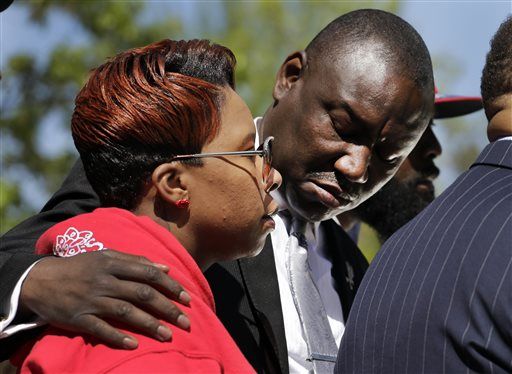Michael Brown’s parents sue over son’s death
Published 2:46 pm Thursday, April 23, 2015
CLAYTON, Mo. (AP) — Michael Brown’s parents filed a wrongful-death lawsuit against the city of Ferguson on Thursday, opening a new chapter in the legal battle over the shooting that killed their son and sparked a national protest movement about the way police treat blacks.
Attorneys for Brown’s parents promised the case would bring to light new forensic evidence and raise doubts about the police version of events. Some of that evidence, they said, had been overlooked in previous investigations.
“The narrative of the law enforcement all across the country for shooting unarmed people of color is the same: That they had no other choice,” attorney Benjamin Crump said. “But time and time again, the objective evidence contradicts the standard police narrative.”
Brown’s parents, Lesley McSpadden and Michael Brown Sr., attended a news conference announcing the lawsuit outside the St. Louis County Courthouse. A tear rolled down McSpadden’s cheek as Crump spoke.
“It’s all part of the journey,” she said.
The case had been expected for months. If it comes to trial, the lawsuit could force a full review of all the evidence in the shooting and bring key witnesses to be questioned in open court, including Darren Wilson, the white officer who shot Brown. Wilson and former Ferguson Police Chief Tom Jackson were also named in the complaint.
Civil cases generally require a lower standard of proof than criminal cases. Jurors must base their decision on a preponderance of evidence, not the proof beyond a reasonable doubt needed to convict in a criminal trial.
A Ferguson spokesman declined to comment, citing the pending litigation. Messages left for an attorney for Wilson were not immediately returned.
Jackson declined to discuss the lawsuit, telling The Associated Press that he was unaware of it until a reporter told him and had not had a chance to review the allegations.
Brown, 18, was unarmed and walking in the street with a friend on Aug. 9 when Wilson told them to move to the sidewalk.
The lawsuit alleges that Wilson told the two to “get the (expletive) out of the street,” causing tension to escalate. Without the “unnecessary and unwarranted profane language,” the encounter would have been “uneventful,” it says.
Moments later, Wilson and Brown engaged in a scuffle through the open window of Wilson’s police vehicle. Wilson shot Brown after the scuffle spilled into the street.
Some witnesses said Brown appeared to be trying to surrender, but Wilson said Brown was moving toward him aggressively, forcing him to shoot.
The attorneys said they planned to cite Wilson’s own initial comments to a supervisor in which, according to the lawsuit, he said Brown had his arms raised moments before the shooting.
Brown’s death led to sometimes-violent demonstrations and spawned a national “Black Lives Matter” protest movement calling for changes in how police deal with minorities. In the end, local and federal authorities ruled that the shooting was justified.
In the months since Brown was killed, unarmed blacks have been shot by police in Wisconsin, Oklahoma, South Carolina and elsewhere. Some of those shootings were caught on video.
A St. Louis County grand jury and the U.S. Justice Department declined to prosecute Wilson, who resigned in November. But the Justice Department released a scathing report citing racial bias and racial profiling in the Ferguson Police Department and in a profit-driven municipal court system that frequently targeted blacks.
After the report, several city officials resigned, including Jackson, the city manager and municipal judge. The municipal court clerk was fired and two police officers resigned over racist emails.
Crump and another attorney for the family, Daryl Parks, said the lawsuit will include evidence that was ignored by the grand jury and the Justice Department, including bullets allegedly fired by Wilson found in buildings.
Civil suits often unfold much differently than criminal matters.
Two decades ago, football star O.J. Simpson was acquitted of the slayings of his ex-wife, Nicole Brown Simpson, and her friend Ronald Goldman. But a civil jury awarded the Brown and Goldman families $33.5 million in wrongful-death damages.
The family of Amadou Diallo, an unarmed man killed by New York police in 1999, settled with the city for $3 million in 2004 after filing a $60 million lawsuit. The city did not admit any wrongdoing. The settlement came after four officers indicted in his shooting were acquitted of second-degree murder and reckless endangerment.
Wrongful-death lawsuits have been filed in other recent high-profile cases, too.
In New York, the family of Eric Garner is seeking $75 million in damages. Garner, who was black and had asthma, died in July after a white plainclothes officer applied what a medical examiner determined was a chokehold after Garner was accused of selling loose, untaxed cigarettes on a city street.




